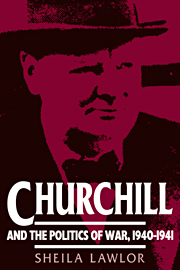Book contents
- Frontmatter
- Contents
- Acknowledgements
- List of abbreviations
- Introduction
- Retrospect
- Part 1 Churchill, the conservative party and the war
- 1 The opposition to Churchill and its causes
- 2 Events and reactions – (1): The German attack on France and its aftermath
- 3 Events and reactions – (2): The Battle of Britain
- 4 Chamberlain, Churchill and the conservative party
- Part 2 The Middle East, imperial defence and the Balkans (October to December 1940)
- Part 3 The Greek Decision (January to March 1941)
- General conclusion
- Bibliography
- Index
1 - The opposition to Churchill and its causes
Published online by Cambridge University Press: 04 August 2010
- Frontmatter
- Contents
- Acknowledgements
- List of abbreviations
- Introduction
- Retrospect
- Part 1 Churchill, the conservative party and the war
- 1 The opposition to Churchill and its causes
- 2 Events and reactions – (1): The German attack on France and its aftermath
- 3 Events and reactions – (2): The Battle of Britain
- 4 Chamberlain, Churchill and the conservative party
- Part 2 The Middle East, imperial defence and the Balkans (October to December 1940)
- Part 3 The Greek Decision (January to March 1941)
- General conclusion
- Bibliography
- Index
Summary
When he came to write his history of the Second World War, Churchill described his becoming prime minister in terms of destiny:
Thus, then, on the night of the 10th of May … I acquired the chief power in the State … I went to bed at about 3 a.m. I was conscious of a profound sense of relief. At last I had the authority to give directions over the whole scene. I felt as if I were walking with destiny, and that all my past life had been but a preparation for this hour and for this trial. Ten years in the political wilderness had freed me from ordinary party antagonisms. My warnings over the last six years … were now so terribly vindicated, that no one could gainsay me.
(Winston S. Churchill, The Second World War, volume I, The Gathering Storm)Churchill's retrospective sentiments on becoming prime minister – relief, a sense that fate had marked him out, detachment from the normal party antagonisms – were shared by many at the time in parliament and the country. But many contemporaries on the conservative side did not concede his claims on destiny. Though he did not acknowledge that the antipathies which he had evoked on many counts had not vanished, he recalled the louder cheer for Chamberlain when both men entered the House of Commons for the first time after he had become prime minister.
- Type
- Chapter
- Information
- Churchill and the Politics of War, 1940–1941 , pp. 33 - 44Publisher: Cambridge University PressPrint publication year: 1994

